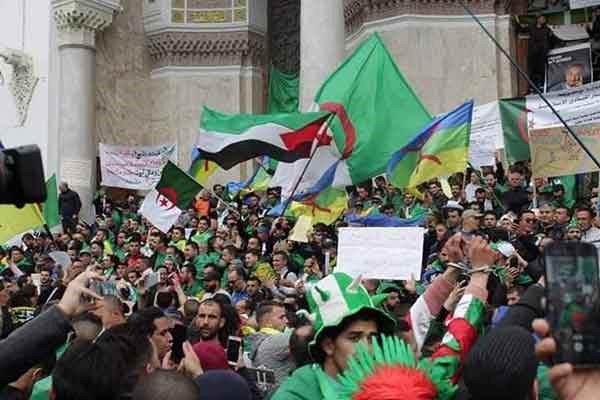Millions of people protested across Algeria on Friday 12 April after they toppled president Abdelaziz Bouteflika. Mass protests and strikes forced out Bouteflika, who announced his resignation on Tuesday 9 April.
The demonstrations began in February after Bouteflika, who had been in power for twenty years, announced he would stand for another term as president.
The huge movement from below had made ruling class support for him untenable. Now that movement can move forward and win more. One of the slogans on Friday’s protests in Algeria was, “No to the 3Bs”. This refers to prime minister Noureddine Bedoui, president of the constitutional council Tayeb Belaiz (who resigned on Tuesday, 16 April) and Abdelkader Bensalah, president of the senate.
Rebels become dictators
The legacy of resistance to the French during the anti-colonial struggle which ended in 1962 has a lasting impact in Algeria. Part of the reason Bouteflika was able to cling on to office for so long was because he was a prominent figure in the struggle against the French occupation. Many of those who fought for independence became the leaders of the Algerian state and ended up doing deals with the old colonial oppressor.
The protests and the resignation of the old president has led to a festival of the oppressed. There is a wide spread of ideas on the future of the protests. There is near-unanimous support for “system change”, but what this means is hotly contested. Some argue for the removal of the corrupt clique of businessmen and politicians that gravitated around Bouteflika—“Le Pouvoir,” or “The Power”. Others argue for a civil state with stronger democratic rights.
Fundamental
Some think more fundamental change is necessary with thoroughgoing economic and social transformation. The people at the top of Algerian society are casting around for a replacement for Bouteflika, one they hope will choke off the fightback by the mass of ordinary Algerians.
Elections are scheduled for three months from now in July. But there is no guarantee these will go ahead, and the military is waiting in the wings. Yet jettisoning unpopular figures from the former regime may not be enough to placate either protesters or rival factions within the ruling class.
A government official said, “The sacred balance between the presidency, the secret services and the general staff is about to be altered. That’s why everyone is worried about what lies ahead.”
The ruling class is terrified of a real challenge to its rule. The protests must continue to keep the pressure on the state.
And the workers’ movement can play the decisive role by stopping the bosses’ profits. Algerian socialist activists have reported strikes across the country. Workers have called strike assemblies and elected strike committees to coordinate demands and action.
Activists from the PST (Socialist Workers Party) posted pictures on Facebook of strikers occupying factories, bus garages and mobilising on the streets. Kouadria Smain, trade union leader and member of the executive of the left-wing Parti des Travailleurs (Workers Party), posted pictures of a mass meeting by striking workers at the IMC medical instrument factory.
Solidarity
The factory is in Rouiba, an industrial city which has already seen workers in state-run factories walk out in solidarity with the mass movement against Bouteflika. IMC workers declared their support for the movement. They also called for better pay and conditions at work and demanded the right to organise a trade union.
The rising tide of protest is shaking up trade unions. Rank and file activists are calling on union leaders close to the regime to quit. Workers at the state-run SONACOM SNVI car factory in Rouiba held up banners calling for the UGTA trade union federation general secretary Sidi Sa’id to go. Sa’id had previously backed Bouteflika.
Four regions of the UGTA—Sa’ida, Bejaia, Tizi Ouzou and Tlemcen—issued a statement demanding Sa’id immediately leave office. The Confederation of Algerian Unions issued a call for a general strike.
The key issue is whether the protests and strikes continue. The ruling class is divided and in disarray, its weaknesses can be exploited.
by Drew POVEY









